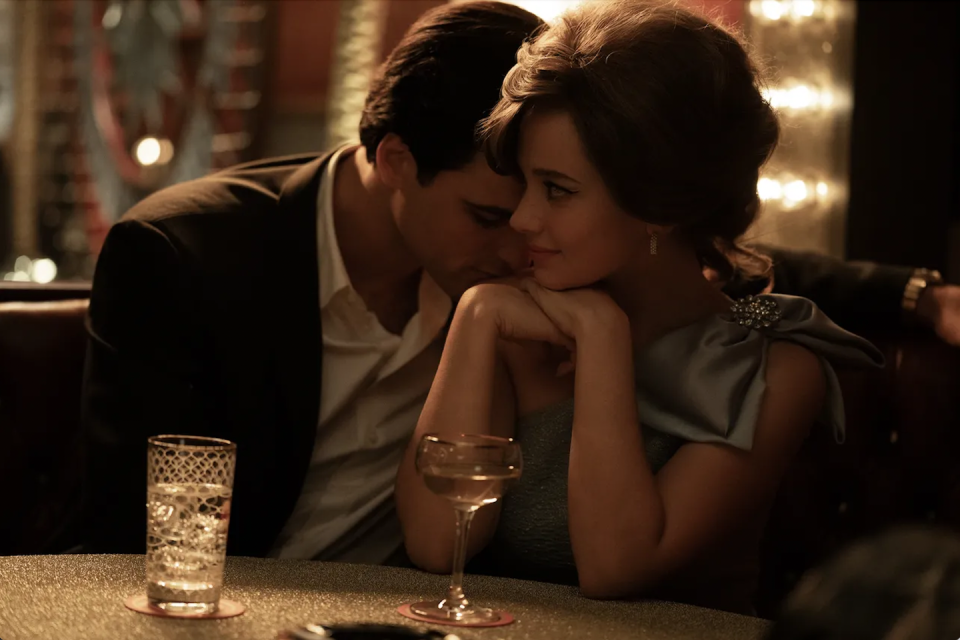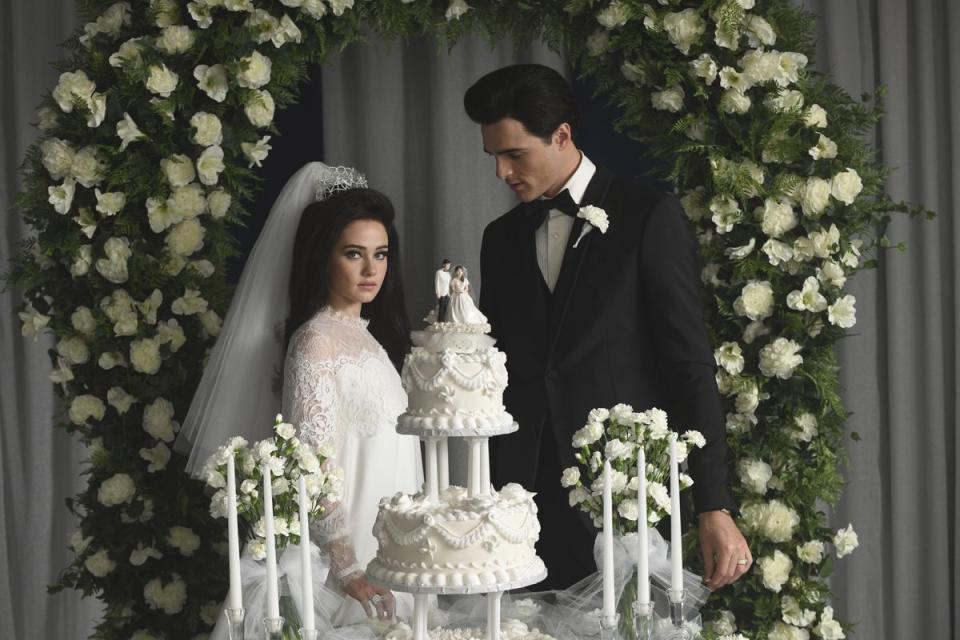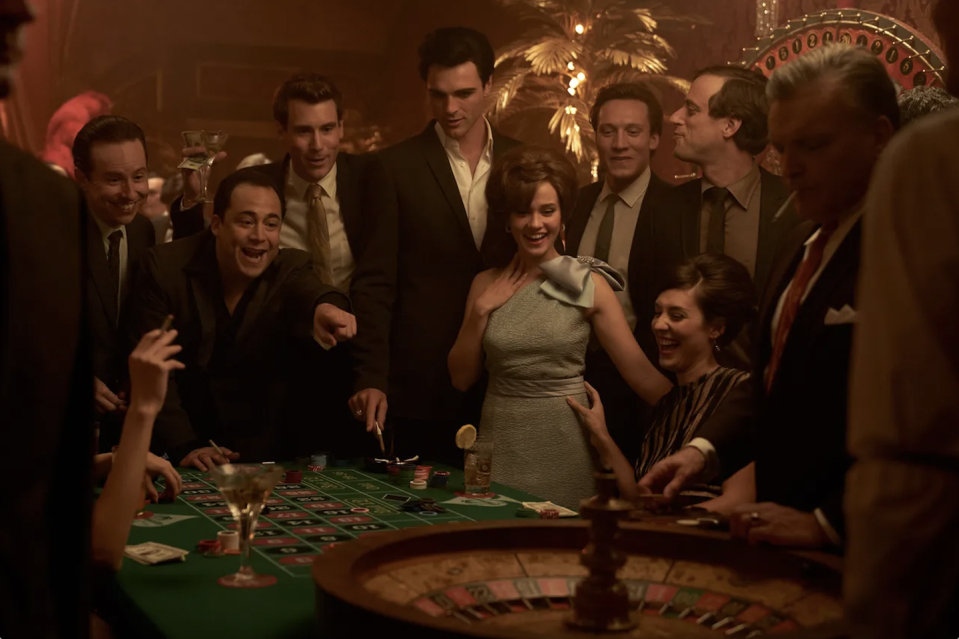Sofia Coppola’s Priscilla opens the door to conversations around powerful men and their supporters

Priscilla Presley’s 13-year relationship with her husband Elvis, wasn’t exactly a well-balanced one. She was 14 when she met the 24-year-old international superstar on a military base in West Germany. It was a relationship in which the dynamics of power were impossibly skewed and seeing it play out on screen in Sophia Coppola’s biopic, Priscilla, makes that impossible to ignore.
The film explores this conflict, delicately navigating viewers around a relationship that Elvis’ young wife (played by Cailee Spaeny) has never considered to be one of victimhood.
Based on Priscilla’s memoir Elvis and Me, Priscilla was written with close consultation from Mrs Presley herself, crafting an accurate image of what it was like meeting the grown man who wanted to date her while she was still in school. We see young Priscilla Presley doing her homework while Elvis (Jacob Elordi) drinks cocktails with his friends. She’s writing him letters on pink stationery; he’s starring in Hollywood movies. It’s clear from the get-go that something isn’t right here but Priscilla is bored, romantic and yearning for a more exciting life.
While the real Priscilla speaks fondly of her late husband, watching the relationship play out through a modern lens and with recent cases of high-profile men engaging in relationships with underage girls fresh in our mind’s eye, the content of the film feels unsettling. More than the age gap of the central relationship, it is how the people around Elvis are portrayed that feels most uncomfortable. His team of managers, handlers and secretaries, even members of Elvis’ own family, actively support the King of Rock ’n’ Roll’s choice to take a school-age girl up to his room every night. As a viewer, you can’t help but question why no one challenged this. Almost every character in the film seems complicit in enabling the relationship.

Of course, what teenager wouldn’t want to hang out with the guy in the posters on their bedroom wall? You can hardly question the motives of a starstruck 14-year-old, but what you can question is a group of grown adults encouraging a relationship like this or even saying nothing to prevent it.
In her memoir Priscilla Presley writes, “He taught me everything: how to dress, how to walk, how to apply makeup and wear my hair, how to behave, how to return love—his way. Over the years he became my father, husband, and very nearly God.” It hardly sounds healthy, but as someone conditioned from a young age by not only Elvis, but everyone around him, can you really blame Priscilla for conflating control with love and seeing this kind of behaviour as a gift as opposed to something much more insidious?
Coppola, known for her nuanced coming of age stories from Virgin Suicides (1999) to Marie Antoinette (2006) and The Beguiled (2017), said in an interview with Rolling Stone, “I feel it’s only my job to show what her experience is like [...] and I think you present things to an audience for them to think about and make their own decisions.” And so, against a gorgeous backdrop of increasingly glamorous dresses, parties, speed, sleeping pills and Catholic school, we see those experiences play out.

While Priscilla sees things her way, Coppola encourages different viewpoints throughout the film. The argument that ‘things were different then’ simply doesn’t stand up and Coppola is careful with this. At six foot five, Elordi cuts an imposing figure against Spaeny in her little pink cardigan and Mary Janes. Coppola returns to Elvis’ concern around the age of consent in the film: Elvis apparently waited to have penetrative sex with Priscilla until she was 18 and this point is repeated in various scenes in the movie, laboured over even. Meanwhile later scenes see him ask her up to his bedroom alone so that no one sees them together, and him repeatedly telling he needs her, that she’s the only person he can talk to and that they have a special secret.
Coppola is careful to let the audience draw their own conclusions of the relationship, but well-placed lyrics from the impeccable ‘50s/’60s soundtrack deftly illustrate the subtext of each scene and though comments like, “she’s like a little girl” are sparse and delivered by supporting characters, they’re poignant and intentional. In one scene, Elvis charms Priscilla’s parents, despite their concerns. “For her age, she’s older and I enjoy her company” he tells them.
And this is exactly why grooming and predatory behaviour can be so difficult to spot – everyone around Elvis acts as though this is all totally normal, so Priscilla feels it’s normal too. We have seen this in recent high-profile cases as grooming victims were led to believe by supporters and friends of these men that everything was ok, that things were supposed to be this way and that nothing untoward was taking place. It’s clear that the narrative is working to expose a situation made possible by a group of adults, rather than judging Priscilla for her choices.

Despite her young age, Coppola presents Priscilla as powerful, not passive and as a girl and woman with agency. But though Priscilla might not have considered Elvis’ behaviour to be predatory or his team to be complicit, that doesn’t mean we can’t come to our own conclusions. The wider context of the situation is glaring – power imbalance, secrecy, even gaslighting. And it all takes place within a private inner circle in which Elvis makes the rules.
Coppola is known for merging the visually gorgeous with the emotionally uncomfortable and it works incredibly well in this instance. As Priscilla’s beautiful life unfolds, we’re acutely aware of the problematic issues around consent, control and personal narrative. The film speaks to the importance of agency and the nuances of girlhood, but ultimately, it shows us the extent to which abuse and manipulation can thrive in an ecosystem of collusion. And that’s something we shouldn’t be so quick to forget.
Priscilla is in cinemas nationwide now.
You Might Also Like

 Yahoo News
Yahoo News 
